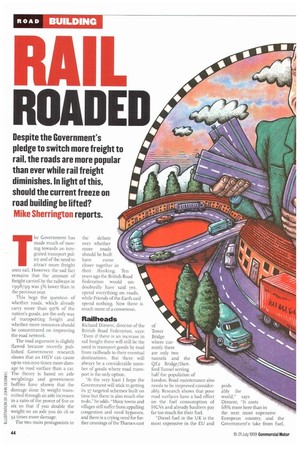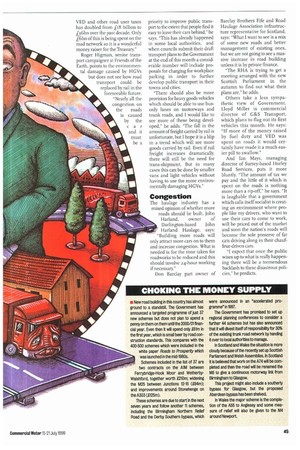RA ROA
Page 46

Page 47

If you've noticed an error in this article please click here to report it so we can fix it.
Despite the Government's pledge to switch more freight to rail, the roads are more popular than ever while rail freight diminishes. In light of this, should the current freeze on road building be lifted? Mike Sherrington reports.
The Government has made much of moving towards an integrated transport policy and of the need to attract more freight onto rail. However, the sad fact remains that the amount of freight carried by the railways in 1998/99 was 3% lower than in the previous year.
This begs the question of whether roads, which already carry more than 90% of the nation's goods, are the only way of transporting freight and whether more resources should be concentrated on improving the road network.
The road argument is slightly flawed because recently published Government research shows that an HGV can cause up to T00,000 times more damage to road surface than a car. The theory is based on axle weightings and government boffins have shown that the damage done by weight transmitted through an axle increases in a ratio of the power of five or six so that if you double the weight on an axle you do 16 or 32 times more damage.
The two main protagonists in the debate over whether more roads should be built have come closer together in their thinking. Ten years ago the British Road Federation would undoubtedly have said yes, spend everything on roads, while Friends of the Earth said spend nothing. Now there is much more of a consensus.
Railheads
Richard Diment, director of the British Road Federation, says: "Even if there is an increase in rail freight there will still be the need to transport goods by road from railheads to their eventual destinations. But there will always be a considerable number of goods where road transport is the only option.
"At the very least I hope the Government will stick to getting its 37 targeted schemes built on time but there is also much else to do," he adds. "Many towns and villages still suffer from appalling congestion and need bypasses, and there is a crying need for further crossings of the Thames east of Tower Bridge where currently there are only two tunnels and the QE2 Bridge/Dartford Tunnel serving half the population of
London. Road maintenance also needs to be improved considerably. Research shows that poor road surfaces have a bad effect on the fuel consumption of HC Vs and already hauliers pay far too much for their fuel.
"Diesel fuel in the UK is the most expensive in the EU and
prob
ably the world," says Diment. "It costs 68% more here than in the next most expensive European country, and the Government's take from fuel, VED and other road user taxes has doubled from fig billion to L36bn over the past decade. Only gbn of this is being spent on the road network so it is a wonderful money raiser for the Treasury."
Roger Higman, senior transport campaigner at Friends of the Earth, points to the environmental damage caused by HGVs but does not see how road transport could be replaced by rail in the foreseeable future. "Nearly all the congestion on the roads is caused by the car and it must be a priority to improve public transport to the extent that people find it easy to leave their cars behind," he says. "This has already happened in some local authorities, and when councils submit their draft transport plans to the Government at the end of this month a considerable number will include proposals for charging for workplace parking in order to further develop public transport in their towns and cities.
"There should also be more provision for heavy goods vehicles which should be able to use busonly lanes on motorways and trunk roads, and I would like to see more of these being developed," he adds. "The fall in the amount of freight carried by rail is unfortunate, but I hope it is a blip in a trend which will see more goods carried by rail. Even if rail freight increases dramatically, there will still be the need for trans-shipment. But in many cases this can be done by smaller vans and light vehicles without having to use the more environmentally damaging HGVs."
Congestion
The haulage industry has a mixed opinion of whether more roads should be built. John Harland, owner of Darlington-based John Harland Haulage, says: "Building more roads will only attract more cars on to them and increase congestion. What is needed is for the time taken for roadworks to be reduced and this should involve 24-hour working if necessary."
Don Barclay part owner of
Barclay Brothers Fife and Road Haulage Association infrastructure representative for Scotland, says: "What I want to see is a mix of some new roads and better management of existing ones, but we are not going to see a massive increase in road building unless it is by private finance.
"The RHA is trying to get a meeting arranged with the new Scottish Parliament in the autumn to find out what their plans are," he adds.
Others take a less sympathetic view of Government. Lloyd Miller is commercial director of GgeS Transport, which plans to flag out its first vehicles this month. He says: "If more of the money raised by fuel duty and VED was spent on roads it would certainly have made it a much easier pill to swallow."
And Ian Mays, managing director of Surrey-based Horley Road Services, puts it more bluntly. "The amount of tax we pay and the little of it which is spent on the roads is nothing more than a rip-off," he says. "It is laughable that a government which calls itself socialist is creating an environment where people like my drivers, who want to use their cars to come to work, will be priced out of the market and soon the nation's roads will become the sole preserve of fat cats driving along in their chauffeur-driven cars.
"I expect that once the public wises up to what is really happening there will be a tremendous backlash to these disastrous policies," he predicts.












































































































